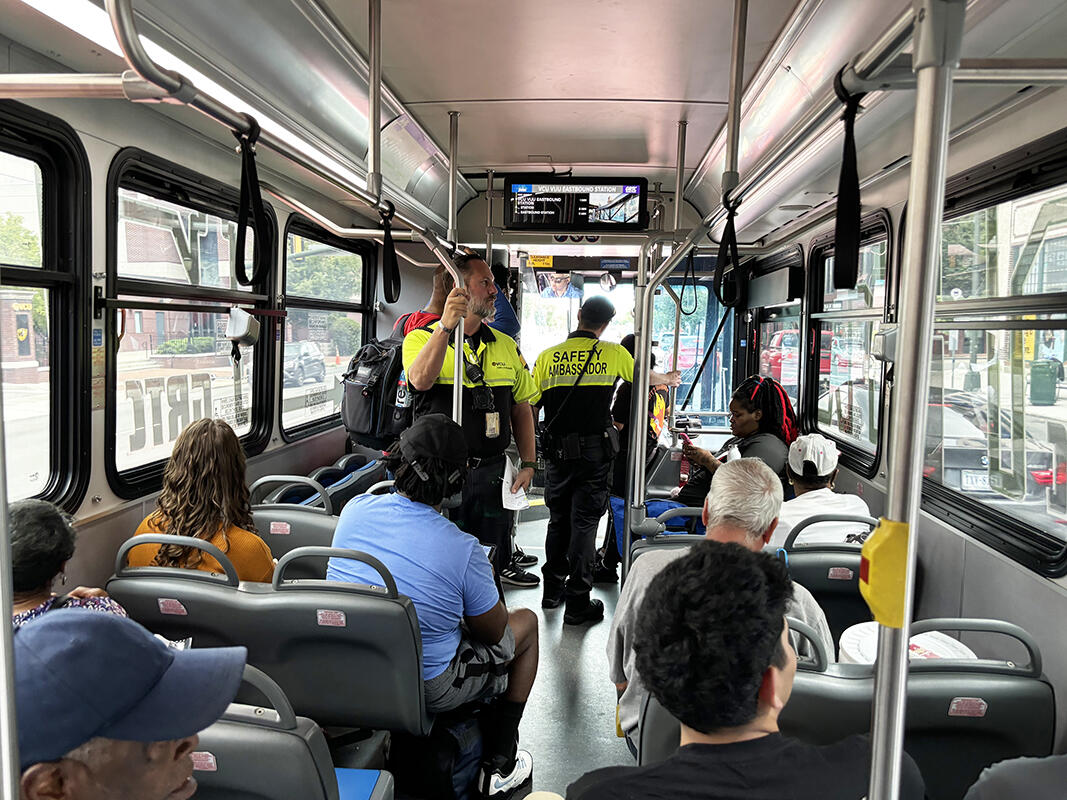
Aug. 26, 2024
Safety ambassadors add a layer of protection and engagement on VCU campuses
Share this story
About Unpacking Safety at VCU: This series highlights some of the programs, initiatives and resources that contribute to the safety and security of students, faculty, staff, visitors and the wider Richmond community.
For new Virginia Commonwealth University students and their families, July’s forum – Navigating Campus Safety – was a chance to learn and ask about a range of topics, from security in campus buildings to how often parking decks are patrolled.
On that last point, Derick Sammons was happy to answer.
“There’s always someone around, whether it’s police officers, safety ambassadors or parking staff,” he said.
The second group – the safety ambassador unit of VCU Police – is a recent addition to the campus landscape, and Sammons is one of six full-time ambassadors who provide supplemental safety services that do not require a sworn police officer.
Activated in early 2023, the unarmed safety ambassadors have handled more than 5,800 calls for service on both VCU campuses, including self-initiated assignments. Calls include mental health checks, assisting drivers with automobile issues, picking up lost property and providing nonemergency transport of patients. They also assist police with staffing major events.
John Venuti, VCU’s associate vice president for public safety and chief of police, said the team was developed in alignment with recommendations from VCU’s Safety and Well-being Advisory Committee. Its members guided VCU’s transition to a new public safety model, which aimed to equitably and more holistically foster the safety and well-being of every individual.
“Ambassadors have been well-received because students and staff know they don’t have to speak with a police officer if it’s not necessary,” Venuti said. “The team is becoming a national model for alternate types of public safety personnel in higher education.”
In summer 2024, the team was highlighted by the Chronicle of Higher Education in a trends snapshot feature, “Expanding Partnerships to Keep Campuses Safe: A Time for Collaboration.”
Safety ambassadors complete training that includes de-escalation of violence, mental health first aid, crisis intervention, traffic direction, using police radios, and administering CPR and first aid. During most of the academic year, they can be seen on the Monroe Park and MCV campuses between 8 a.m. and 11 p.m., seven days a week.
Jihad Aziz, Ph.D., the executive director of University Counseling Services, said safety ambassadors offer students a level of comfort, especially in mental health crises.
“VCU Police has been able to provide options,” Aziz said. “Students might be uncomfortable with a sworn officer … and they have multiple avenues to engage in safety and well-being in a way that makes them feel more comfortable.”
Brian Sussman, supervisor of the safety ambassador program, oversees training and assignments. He said the team has a unique opportunity to de-escalate potentially volatile situations.
“Safety ambassadors don’t wear vests or carry weapons,” he said. “Because they’re not armed, it shuts down a potential barrier with students and starts an immediate feeling of trust and understanding.”
Sussman said safety ambassadors work on special events, including police outreach events, which helps bridge the gap between police and community members. Over time, the team’s responsibilities have grown.
“From the time we began taking calls, we knew we had to grow and take on as much responsibility as we could when it came to assisting students and supporting police officers,” Sussman said. “Calls for assistance have grown over the last year, and we predict they will continue as we cement ourselves into the safety fabric of the university.”
VCU Police focuses on its deployment of resources and how officers and ambassadors can best serve VCU and the surrounding community, Venuti said.
“Keeping sworn officers available for more serious situations means better response times during critical incidents,” Venuti said. “This model allows us to help anyone needing assistance with minimal delays.”

In a spring 2024 safety survey, 80% of respondents reported being aware of safety ambassadors. Additionally, 42% said having the ambassadors increased their feelings of safety.
The team also includes part-time student safety ambassadors who conduct foot patrols and address potential safety issues on both campuses.
Jackson Newman is a rising senior majoring in criminal justice, homeland security and emergency preparedness. He started as a part-time student safety ambassador last year and thought the job was a great fit for his professional interests.
While Newman has been on patrol, students have approached him to ask for directions and about the safety ambassador program. He also has helped full-time ambassadors with jump-starting cars and staffing on-campus events.
“Our role is unique in that we’re also students, so if students don’t want to talk to an officer, they can turn to a safety ambassador to answer questions or if they need help,” Newman said.
He has enjoyed making sure students feel safe where they live and go to school, and he noted that new students and their families have “absolutely” been receptive to ambassadors.
“It makes them happy to see not just police officers but student and full-time safety ambassadors,” Newman said, “so you essentially have a whole team protecting the campus and looking out for students.”
Subscribe to VCU News
Subscribe to VCU News at newsletter.vcu.edu and receive a selection of stories, videos, photos, news clips and event listings in your inbox.












